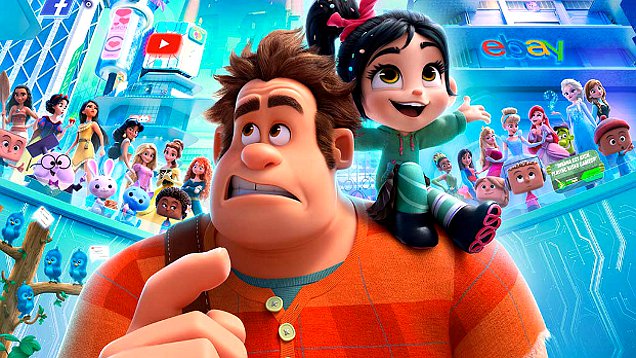Despite its sweet message, Ralph Breaks the Internet is more tired than wired

This sequel to Wreck-It Ralph builds a bland, busy movie that attempts parody but falls flat, writes Sarah Ward.
With 2012’s Wreck-It Ralph, Disney introduced the world to a winner – who happened to be a video game villain. Inside every brick-throwing behemoth lies a heart of gold, the affectionate and vibrant animation posited, while immersing viewers young and old in its retro arcade domain. Worthy messages, bright and detailed imagery, a story with drama and emotion: the Rich Moore-directed original effort had plenty of charms. It might’ve taken six years to make a sequel, but a follow-up was always inevitable, as was Ralph’s next destination. After exploring the nostalgic realm of ‘80s-style gaming, Ralph Breaks the Internet takes its hulking hero online.
Life has been good to Ralph (voiced by John C. Reilly) since viewers last saw him. He plays his antagonistic part in the game Fix-It Felix Jr., enjoys a beer or several when Litwak’s Family Fun Center & Arcade closes each night, and spends as much time as he can with racer Vanellope (Sarah Silverman). But his pint-sized best friend, a character from the candy-coloured Sugar Rush game, can’t say the same. She’s content enough; however she’s beginning to ponder that haunting question that even bothers people made of pixels: is this all there is?
There’s nothing like a broken controller – and the prospect of her game being unplugged and discarded from the arcade, leaving her homeless – to kick Vanellope’s existential malaise into gear. And, after Ralph sources a replacement part on eBay, to send the duo hurtling through cyberspace. While Ralph tries to fix his friend’s problem, Vanellope discovers a world she had never even dreamed of, including a hardly sweet or sugary racing game called Slaughter Race. There is more to life than her usual routine with Ralph, and it involves high-octane stunts, outlaws and Grand Theft Auto-style antics, as well as the notorious, no-nonsense but kindly Shank (Gal Godot).
A tale not only of a character looking for something beyond their comfort zone, but of a girl learning that rainbows, fairy floss and pastel hues aren’t her only options, Vanellope’s story is a worthy one. So is the dilemma that comes with the lure of this new, gritty, dangerous future, at least for Ralph: if Vanellope stays outside the arcade, how will they spend every spare second together? But in the hands of Moore and co-director Phil Johnston (a writer on the original), working with a script by the latter with Pamela Ribon (Moana), Ralph Breaks the Internet remains pixel-thin. Worse – it squanders its heartfelt central story by surrendering to one of the worst filmmaking trends over the past few years.
What Tron, Tron: Legacy and The Matrix each managed, the likes of Pixels, The Emoji Movie, Ready Player One and now Ralph Breaks the Internet have all struggled with: making the digital domain feel tangible. Taking an overly literal approach hasn’t done the latter bunch of films any favours, even when they’re trying to be comedic and satirical. Name-dropping every brand that rules our online lives, creating spaces and shapes to embody shopping at eBay or reading tweets, and finding straightforward ways to represent search engines and pop-up ads all take up far too much of Ralph Breaks the Internet’s running time, with few visual, emotional or narrative rewards. If Disney was trying to reflect the way the internet can suck up a person’s time while leaving them with little to show for it, it’s achieved that at least. Otherwise, the film simply builds a bland, busy movie predicated upon giving the virtual realm a physical manifestation.
Ralph, largely playing a supporting role in his own sequel, navigates a subplot about the disposable nature of viral video stars. Desperate to earn enough money to buy the Sugar Rush controller, he teams up with the algorithm Yesss (Taraji P. Henson) to court the eyeballs of BuzzzTube viewers – another attempt at parody that falls flat because it’s both too literal and too easy. The same applies to Disney poking fun of its own multimedia dominance. Pointing out the similarities and tropes among its princesses is a tongue-in-cheek touch, but a safe one. And, with Marvel, Star Wars and Pixar brands all referenced alongside a long list of other Disney properties, Ralph Breaks The Internet acts as an ad for the company’s vast catalogue more than a joke about it.
Less distractions, more substance – that’s a wish list for the internet in general, of course, but it rings true for this cyber-obsessed all-ages effort. With the movie at its best when it’s focusing on the emotional journeys of its two protagonists and at its worst when it’s wasting time online (and wallowing in product placement), Ralph doesn’t break the internet; rather, it breaks his film.

















